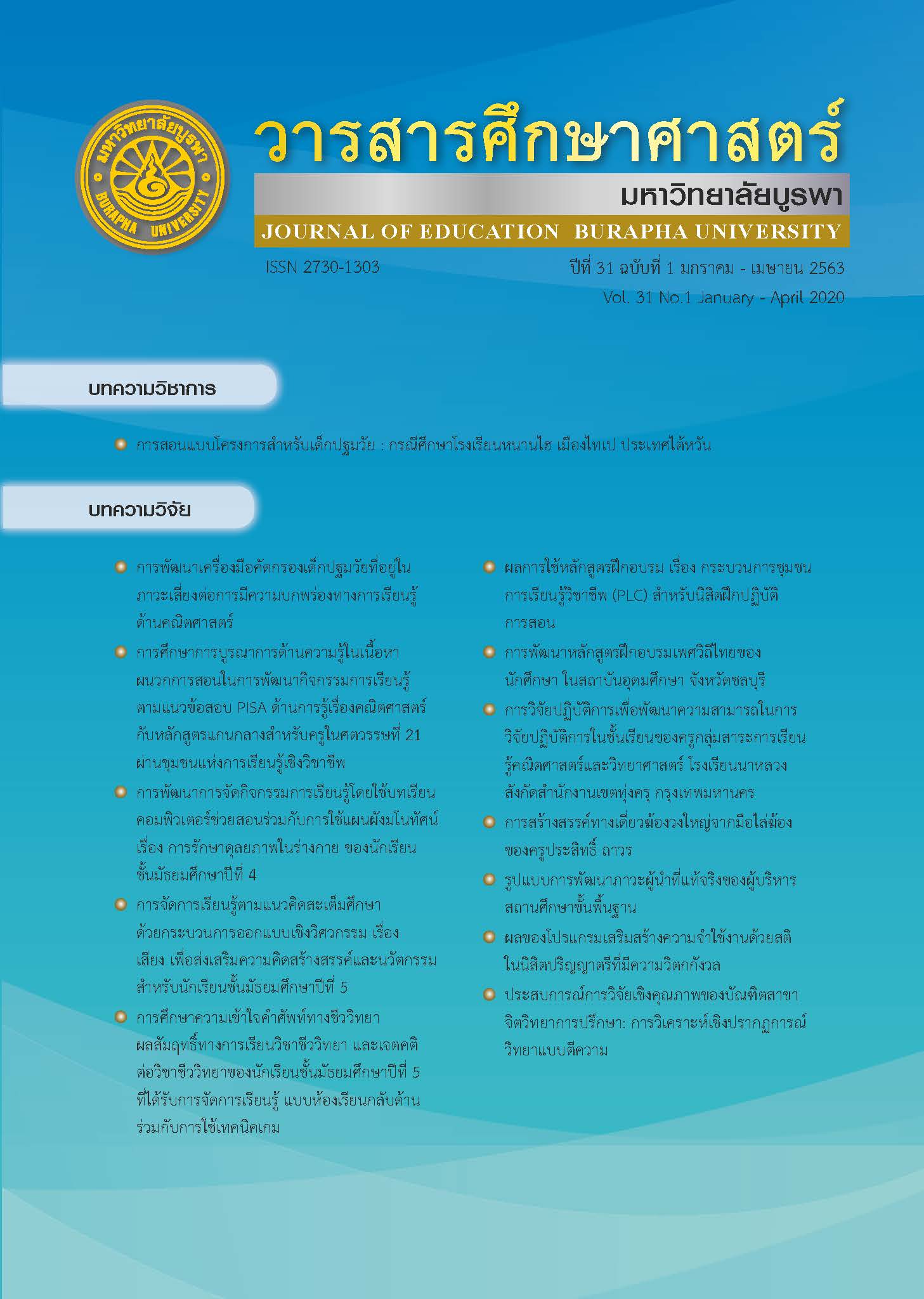The Model of Authentic Leadership Development for Administrators in Basic Education Schools
Keywords:
model of authentic leadership development, authentic leadership, administrators in basic education schoolsAbstract
The purposes of this research were 1) to study components for developing authentic leadership of administrators in basic education schools. 2) to study guidelines for developing authentic leadership of administrators in basic education schools. 3) to design a model of authentic leadership development for administrators in basic education schools, and 4) to assess its appropriateness for administrators in basic education schools. The components of authentic leadership were resulted from the analysis of school administrators’ questionnaires with sample size of 405. The model was developed from the results of components and guidelines for developing the authentic leadership by conducting the interviews with five professional experts with highly leadership roles. The drafted model was examined by 18 qualified experts for its appropriateness. Research tool was a questionnaire of which a reliability value of .96 and semi-structured interviews. Research data were analyzed by mean, standard deviation, confirmatory factor analysis and content analysis.
The findings were as follow :
- The authentic leadership of administrators in basic education schools was comprised of seven components including self-awareness, justice, ethical perspective, transparency, positive thinking, responsibility and capability for keeping pace with global change.
- The guidelines for developing the authentic leadership of administrators in basic education include methods, activities, and process for authentic leadership development.
- The model of authentic leadership development for administrators in basic education schools consists of; 1) Seven components for developing the authentic leadership of administrators in basic education schools, and 2) The guidelines for developing the authentic leadership of administrators in basic education schools. The guidelines include five methods and six activities. The process of development namely PIER was combined with planning, implementation, evaluation, and reflection. Lastly, 3) The key success factors for developing the authentic leadership of administrators in basic education schools include curriculum, resource support, monitoring and evaluation, network building for administrators’ authentic leadership development.
4. The appropriateness assessment of the model of authentic leadership development for administrators in basic education schools was at very good level
References
ขวัญตา บุญวาศ. (2559). การพัฒนาอาจารย์ในการจัดการเรียนรู้แบบสะท้อนคิด ของวิทยาลัยพยาบาลและวิทยาลัยการสาธารณสุขเครือข่ายภาคใต้ สถาบันพระบรมราช
ชนก. วารสารพยาบาลกระทรวงสาธารณสุข วารสาร, ปีที่ 26 (ฉบับที่ 3 กันยายน – ธันวาคม 2559),130-143.
ฉัตรสุมาลย์ กบิลสิงห์. (2557). ผู้นำกระบวนทัศน์ใหม่ ภาวะผู้นำทางจิตวิญญาณ [ศักดิ์สินี เอมะศิริ, ผู้สัมภาษณ์]. ผู้นำแห่งอนาคต : คุณธรรมการนำร่วม และการ
เปลี่ยนแปลงภายใน. นครปฐม : โครงการผู้นำแห่งอนาคต ศูนย์จิตตปัญญาศึกษา มหาวิทยาลัยมหิดล. 4–13.
ชัชวาลย์ ศิลปกิจ. (2557). สติกับภาวะผู้นำ [ศักดิ์สินี เอมะศิริ, ผู้สัมภาษณ์]. ผู้นำแห่งอนาคต : คุณธรรมการนำร่วม และการเปลี่ยนแปลงภายใน. นครปฐม : โครงการผู้นำ
แห่งอนาคต ศูนย์จิตตปัญญาศึกษา มหาวิทยาลัยมหิดล. 15-24.
ชัยเสฎฐ์ พรหมศรี. (2561). ภาวะผู้นำสำหรับผู้บริหารองค์การ : แนวคิด ทฤษฎีและกรณีศึกษา. กรุงเทพมหานคร : ปัญญาชน.
ธีระ รุญเจริญ. (2556). วิกฤติและทางออกในการบริหารและจัดการการศึกษา. วารสารวิจัยและพัฒนา มหาวิทยาลัยราชภัฏบุรีรัมย์, ปีที่ 8 (ฉบับที่ 1), 96-107. สืบค้นจาก
http://gradjournal.bru.ac.th.
ธีรภัทร กุโลภาส. (2556). ภาวะผู้นำที่แท้จริงที่มีต่อผลสัมฤทธิ์ทางการเรียนของนักเรียนโดยมีการมองโลกเชิงบวก ทางวิชาการและยึดมั่นผูกพันกับครูเป็นตัวแปรส่งผ่าน
และขนาดโรงเรียนเป็นตัวแปรปรับ (วิทยานิพนธ์ครุศาสตร์ดุษฎีบัณฑิต), จุฬาลงกรณ์มหาวิทยาลัย. กรุงเทพมหานคร.
นิรันดร์ เนตรภักดี. (2555). โมเดลสมการโครงสร้างภาวะผู้นำอย่างแท้จริงของผู้บริหารสถานศึกษา สังกัดกรมส่งเสริมการปกครองท้องถิ่น (วิทยานิพนธ์ปริญญาปรัชญาดุษฎี
บัณฑิต), มหาวิทยาลัยขอนแก่น. ขอนแก่น.
เนตร์พัณณา ยาวิราช. (2556). ภาวะผู้นำและผู้นำเชิงกลยุทธ์. กรุงเทพมหานคร : ทริปเพิ้ลกรุ๊ป.
บุญอยู่ ขอพรประเสริฐ. (2554). แนวทางการพัฒนามาตรฐานความโปร่งใสของหน่วยงานภาครัฐ. วารสารวิทยาการ จัดการ, ปีที่ 28 (ฉบับที่ 1 มกราคม - มิถุนายน 2554),
33-48. สืบค้นจาก http://www.exat.co.th/contents/filemanager/info/26%20Transparency%20management.pdf.
บุษยา วีรกุล. (2558). ภาวะผู้นำ. กรุงเทพมหานคร:โครงการส่งเสริมและพัฒนาเอกสารวิชาการ สถาบันบัณฑิตพัฒนาบริหารศาสตร์.
ปิลันธนา แป้นปลื้ม. (2560). อิทธิพลของความยุติธรรมในองค์การต่อผลการปฏิบัติงานตามบทบาทหน้าที่ผ่านการรับรู้การสนับสนุนจากองค์การ. วารสารอิเล็กทรอนิกส์การ
เรียนรู้ทางไกลเชิงนวัตกรรม(e-JODIL), ปีที่7(ฉบับที่ 1 มกราคม – มิถุนายน 2560), 55-67. สืบค้นจาก http://e-jodil.stou.ac.th/filejodil/14_4_535.pdf.
รังสรรค์ ประเสริฐศรี. (2544). ภาวะผู้นำ (Leadership). กรุงเทพมหานคร:ธนรัชการพิมพ์.
รัตนา กาญจนพันธุ์. (2552). จริยธรรมสำหรับผู้บริหาร. กรุงเทพมหานคร:มหาวิทยาลัยรามคำแหง.
รัตติกรณ์ จงวิศาล. (2556). ภาวะผู้นำ ทฤษฎี การวิจัย และแนวทางสู่การพัฒนา. กรุงเทพมหานคร:โรงพิมพ์แห่งจุฬาลงกรณ์มหาวิทยาลัย.
วรรณวิภา ไตลังคะ (2555). การประเมินผลการปฏิบัติงานแบบ 360 องศา: ข้อจำกัด และปัจจัยแห่งความสำเร็จ. วารสารวิชาการมหาวิทยาลัยปทุมธานี. ปีที่ 4 (ฉบับที่ 2
พฤษภาคม – สิงหาคม), 210-231.
สมหมาย อ่ำดอนกลอย. (2556). บทบาทผู้บริหารสถานศึกษาในศตวรรษที่ 21. วารสารบัณฑิตศึกษามหาวิทยาลัยราชภัฏพิบูลสงคราม. ปีที่ 7 (ฉบับที่ 1 มกราคม –
มิถุนายน), 1-7.
สุธาสินี แสงมุกดา. (2554). การพัฒนาเครื่องมือวัดภาวะผู้นำที่แท้จริงของผู้บริหารสถานศึกษาขั้นพื้นฐาน(วิทยานิพนธ์ครุศาสตร์ดุษฎีบัณฑิต), จุฬาลงกรณ์มหาวิทยาลัย.
กรุงเทพมหานคร.
สุนทรพจน์ ดำรงค์พานิช. (2555). โปรแกรม Mplus กับการวิเคราะห์ข้อมูลทางพฤติกรรมศาสตร์และสังคมศาสตร์.
มหาสารคาม : สำนักพิมพ์มหาวิทยาลัยมหาสารคาม.
สำนักงานคณะกรรมการการศึกษาขั้นพื้นฐาน กระทรวงศึกษาธิการ. (2551). หลักสูตรแกนกลางการศึกษาขั้นพื้นฐานพุทธศักราช 2551. กรุงเทพมหานคร : ชุมชนสหกรณ์
การเกษตรแห่งประเทศไทย จำกัด
สำนักคณะกรรมการการศึกษาขั้นพื้นฐาน กระทรวงศึกษาธิการ. (2561). ครบรอบ 15 ปี สำนักงานคณะกรรมการการศึกษาขั้นพื้นฐาน. วารสารวิชาการ ฉบับพิเศษ, ปีที่ 21
(ฉบับที่ 3 กรกฎาคม – กันยายน 2561). 23-24.
อิทธิภัทร์ ภัทรเมฆานนท์. “การโค้ช” กับภาวะผู้นำตามคุณลักษณะของตนที่แท้จริงในศตวรรษที่ 21 [ศักดิ์สินี เอมะศิริ, ผู้สัมภาษณ์]. ผู้นำแห่งอนาคต : คุณธรรม การนำร่วม
และการเปลี่ยนแปลงภายใน. นครปฐม : โครงการผู้นำแห่งอนาคต ศูนย์จิตตปัญญาศึกษา มหาวิทยาลัยมหิดล. 45-61.
อุษา ชูชาติ และลัดดา อินทร์พิมพ์. (2558). บทวิเคราะห์ : มุมมองด้านการศึกษาของนายกรัฐมนตรี (ประยุทธ์ จันทร์โอชา). วารสารวิจัยการศึกษา สำนักงานเลขาธิการสภา
การศึกษา, ปีที่ 3(ฉบับที่ 6 มกราคม – มีนาคม), 16.
Avolio and Gardner (2005). Authentic leadership development: Getting to the root of positive forms of leadership. The Leadership Quarterly. 16 :
315-338.
Eisner, E. (1976). Education connoisseiship and criticism, Their form and function in education evaluation. Journal of Aesthetic Education. 39(2),
192-193
George B. (2003). Authentic Leadership : Rediscovering the Secrets to Creating Lasting Value. San Franciso : Jossey- Bass.
George B. (2007). True North : Discovery Your Authentic Leadership. San Franciso : Jossey-Bass.Ilies R., Morgeson. F. & Nahrgang. J. (2005).
Authentic Leadership and eudaemonic well-being:
Understanding leader-follower outcomes. The Leadership Quarterly. 16:373-394.
Luthans, F.& Avolio, B.J. (2003). Authentic leadership development. In K.S. Cameron, J.E. Dutton, & R.E.Quinn (Eds.), Positive Organizational
Scholarship : Foundations of a New Discipline. San Francisco, CA: Berrett-Koehler, 241-258.
Papa, R. (2011). Technology leadership for school improvement. Thousand Oaks: Sage Publications.
Walumbwa, F. O., Avolio, B. J., Gardner, W. L., Wernsing, T. S., & Peterson, S. J. (2008). Authentic Leadership: Development and Validation of a
Theory-Based Measuret. Journal of Management, 34(1), 89-126.
Wong, C.A. (2008). The Role of Authentic Leadership in Nursing and Healthcare. Canada : University of Alberta.
Downloads
Published
How to Cite
Issue
Section
License
บทความทุกบทความเป็นลิขสิทธิ์ของวารสารศึกษาศาสตร์ มหาวิทยาลัยบูรพา



